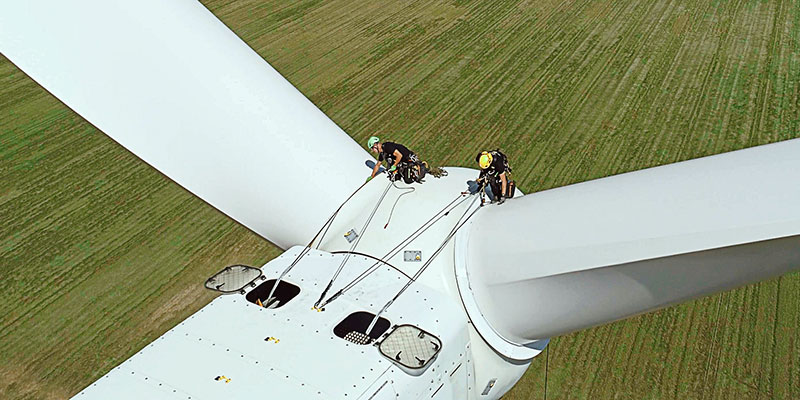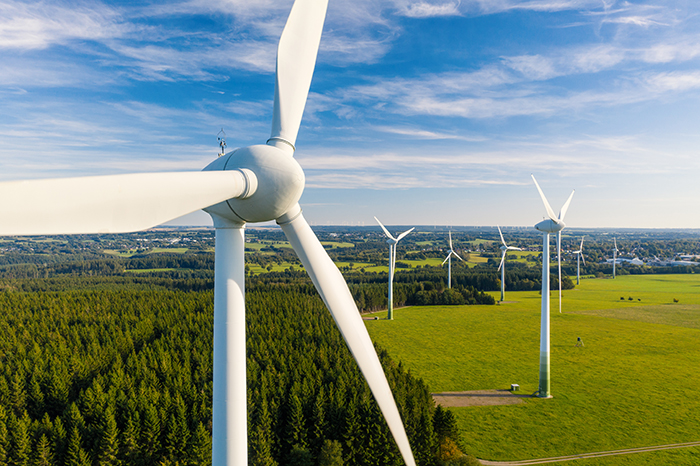Professions in wind energy
The wind energy sector is facing a promising future. The sustainable nature of this form of energy, coupled with global efforts to reduce greenhouse gas emissions, makes it a cornerstone of the energy transition. Dedicated professionals who choose a career in the wind energy industry can not only achieve personal success, but also actively contribute to tackling global environmental challenges. Germany is on the way to transforming its energy system, and wind energy plays a central role in sustainable, climate-friendly energy supply.
With its wind energy sector, Germany is also making a significant contribution to sustainable energy supply and climate protection globally. With a growing demand for qualified specialists, this industry not only offers promising career opportunities, but also enables you to play an active role in tackling global environmental problems – be part of the change.
Energy careers with a future
Around 300,000 people are employed in the renewable energy sector in Germany. Since the turn of the millennium, the number of workers in this sector, including in wind energy, has quadrupled. There are various professions in this sector, ranging from engineers and technicians to site optimisation specialists.

Engineers are crucial for the planning and development of wind turbines. Assembly and service technicians are responsible for erecting and maintaining the wind turbines on site. This includes assembling the rotor blades, erecting the tower and installing the technical components. During operation, they take care of inspections, repairs and regular maintenance. The optimal alignment and positioning of wind turbines requires expertise in order to maximise the efficiency of electricity generation.
Electronics technicians ensure that the electronic components always run smoothly so that the wind energy is efficiently converted into electricity. Industrial climbers are used in places where larger machines and scaffolding can hardly reach – e.g. for maintaining the rotor blades of wind turbines. Offshore coordinators take care of everything to do with offshore wind power platforms, from monitoring deliveries to checking the condition of equipment.
Are you interested to enter a wind energy career?
To give you a better overview, we have described the most important professions related to wind turbines for you in a little more detail:
-
Wind Turbine Service Engineers
In the field of wind power, service involves maintenance and operation assurance once the turbine is installed. This includes maintenance,…
-
Wind Turbine Service Technicians
In wind power service, the focus is on maintaining and ensuring the operation of the turbine. This involves repairing, maintaining,…
-
Offshore Coordinator
The coordination and monitoring of deliveries and inventory on offshore platforms are essential for their operation. You ensure that there…
-
Industrial rope access technician
Working at great heights and in hard-to-reach areas is everyday bread and butter for industrial rope access technicians. You are…
-
Wind Turbine Technicians / Electricians
In wind power installations, complex electricians are used, which require not only installation but also maintenance. This means that the…
There are also a number of other professions that find employment in wind energy.
In the area of research and development, scientists and engineers work on optimising wind energy technologies. Their focus is on increasing efficiency, reducing costs and developing new technologies in order to maximise the contribution of wind energy to a sustainable energy supply.
Electrical engineers and energy experts are needed to integrate wind energy into existing power grids. They develop strategies for efficiently feeding wind energy into the grid to ensure a reliable energy supply.
Specialists in environmental management and approval procedures are also important to ensure that wind energy projects are environmentally friendly and fulfil all legal requirements.
Last but not least, commercial professions play a role, from project managers who oversee the planning and realisation of wind farms to sales and marketing experts who promote the marketing of wind energy products.

Renewable energy: Wind energy
Germany has set itself ambitious climate targets that envisage complete climate neutrality by 2045. By 2030, 65% fewer greenhouse gases are to be emitted compared to 1990 levels. The energy industry makes a significant contribution to greenhouse gas emissions. The expansion of renewable energies, particularly wind energy, is therefore crucial to achieving these targets.
The wind energy sector not only offers environmental benefits, but also economic opportunities. Companies in this sector need a large number of qualified and committed employees to drive the growth of the industry. The expansion of wind turbines requires not only engineers and technicians, but also specialists in environmental compatibility, site optimisation and other relevant areas.
Onshore versus offshore wind turbines
Germany occupies a leading position in the offshore wind energy sector in particular. The offshore wind farms off the North Sea coast are particularly productive, as the wind speeds there are high and constant. This enables continuous and efficient electricity generation.
In contrast to offshore wind turbines, onshore turbines are located on land and produce a good 13 % of the electricity in Germany. Although the wind is less strong and constant on land, onshore plants are cheaper and easier to build and feed the electricity generated into the grid.
Wind energy helps to achieve climate targets
The basis of wind energy lies in the utilisation of air currents caused by temperature differences. The sun’s rays heat the air to varying degrees, which leads to pressure differences and ultimately generates wind. This wind energy is converted into electrical energy by, among other things, wind turbines, which capture the wind with their rotating blades and convert it into kinetic energy.
The energy generated is then converted into electrical energy using generators and fed into the power grid. A key advantage of wind energy is its environmental friendliness. No greenhouse gases are released during the operation of wind turbines, which makes a positive contribution to reducing air pollution and mitigating climate change. This makes wind power a sustainable energy source that has no negative impact on the environment compared to fossil fuels such as coal or oil.
